Grayson Perry: Will Gompertz reviews the artist's show at Holburne Museum in Bath ★★★★☆

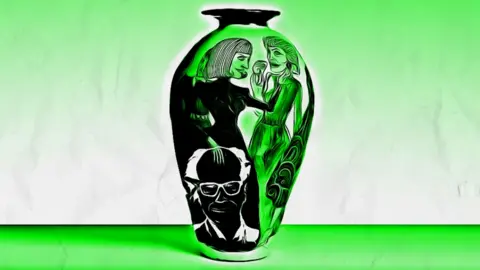 BBC
BBCThe Holburne Museum in Bath will have a nightmare on its hands if its exhibition Grayson Perry: The Pre-Therapy Years is even remotely successful. There will be havoc. Punters will turn on the genteel Georgian institution like Frankenstein's monster, furious with the darkly satirical show it has created.
It won't be the contents that rattles their collective cage, which is exactly what you'd expect from the Turner Prize-winning potter, but the way it has been displayed. Or, more specifically, the shortcomings of the first room of the show.
It is tiny.
Put a dozen or so people in there and it will feel more like a game of sardines than an art reconnaissance trip. One minute you'll be admiring a large photograph of a young, naked Grayson covered in paint, the next Mrs Stockbridge from The Crescent will be squeezing past his decorated member apologising for the coarseness of her tweed suit.
You can't avoid it.
The first room, that is. The exhibition is hung chronologically and most people like to start at the beginning.
The good folk at the museum will have to figure out how to manage visitor flow (there's a secret door that could come into play) because the space isn't just very small, it is also full of objects and you stay in there for three films that collectively last over an hour.
This is where we first meet the recently graduated Grayson who, we discover, is on the hunt for his artistic voice. He's not short of things to say - he's never short of things to say - but is yet to find the medium through which to communicate. He is living in a north London squat and hanging out with a bohemian crowd, including a pre-pop star Boy George, and, on occasion, Derek Jarman, the avant-garde film-maker and elder statesman.

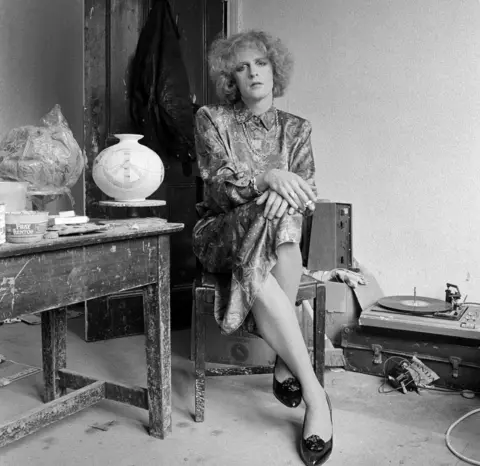 Matthew Lewis
Matthew Lewis
Perry starts by making films, which have not aged well.
He dabbles in performance art, and then accepts an invitation from his girlfriend's sister to come along to her pottery night class. And that is where this show begins, with a small brown plate called Kinky Sex (1983), which he produced a few weeks after starting the course.
It is not very good, either technically or artistically, but it is distinctly Grayson Perry in tone and aesthetic.
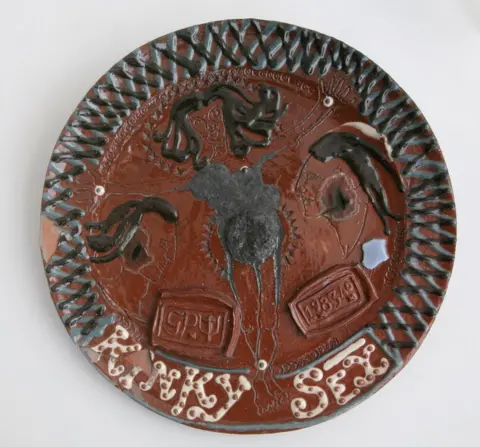 Grayson Perry/Victoria Miro
Grayson Perry/Victoria MiroThe plate shows two heads in profile either side of a long-haired, crucified central figure welded to the plate by a melted coin over his or her privates (sexes are ambiguous). It is, like all his work, fantastical and pointed, realised with a drawn line that is as distinctive as his throaty cackle.
There is a Hieronymus Bosch-like detail in these early bits and pieces, mischievous layers of words, picture and material that subvert the medium and the apparent naivety of the image.
Essex Plate (1985), for example, gives us a nice traditional coastal landscape with a boat bobbing around under a warming sun.
It's Turneresque, almost.
Until you see the black clouds gathered over the heads of the outlined faces and read the words printed on the rim:
"LA LA LA LA HARMONY PEACE AND LOVE THE NON MAGICK OF MEN WILL KILL US ALL."
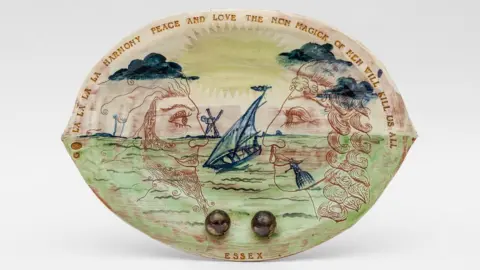 Grayson Perry/Victoria Miro
Grayson Perry/Victoria MiroGrayson wears his heart on his work.
He reveals his frustrations as well as his fetishes in pieces such as Self Portrait Cracked and Warped (1985), in which we see his likeness served upside down on a plate. It is a sarcastic homage to the German expressionist painter Georg Baselitz, who Perry resentfully saw as a "macho" artist with global recognition working in a respected medium, while he struggled in obscurity making pots often perceived by a sniffy art world as lowly craft objects.
Baselitz was selling his work for huge sums, Grayson was selling his for a few quid.
But he was selling, as this show attests. Maybe it was only for £40 here and £50 there, but it was enough to stop him opting for career Plan B, which was to become a copywriter in an ad agency.
And for that, we should be grateful.

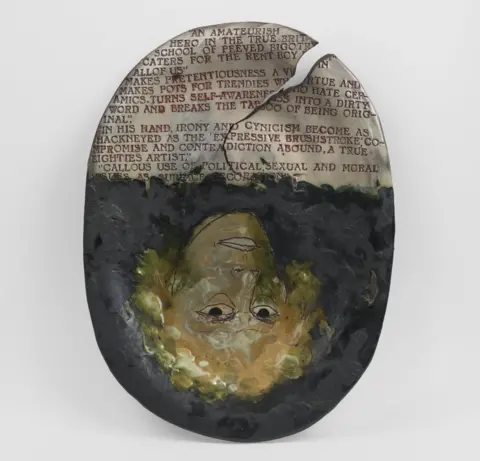 Grayson Perry/Victoria Miro
Grayson Perry/Victoria Miro
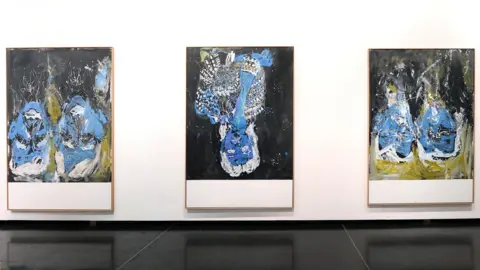 Getty Images
Getty ImagesI'm sure the witty Mr Perry would have been a big success at Saatchi & Saatchi or wherever he ended up, but the world would have been a poorer place without his pagan pots and confessional plates, on which he smuggled what were then outre ideas and opinions about gender, sex, class, and taste.
All art is autobiographical, but Perry's is specifically so, in much the same way as that of his fellow contemporary British artist Tracey Emin, who also uses craft materials to tell her story. The upshot of that means this show is more than a retrospective of his early works. It's also a diary of a young transvestite artist honing his talent and finding his way in the highly competitive art world of the late 1980s and early '90s when the YBAs (Young British Artists) ruled the roost.
There is a rawness to his art, which goes beyond what he describes as technical "ineptitude", and leans towards a punk-influenced anger and distaste for establishment conventions.
Can you imagine Bernard Leach, the father of modern British pottery, approving of Untitled (1988)?
It is an oval, glazed terracotta plate with a cream background, on which we see a tableau consisting of a bemused transvestite with a shopping trolley surrounded by a variety of images from flowers on one side to a sinister wedding on the other.
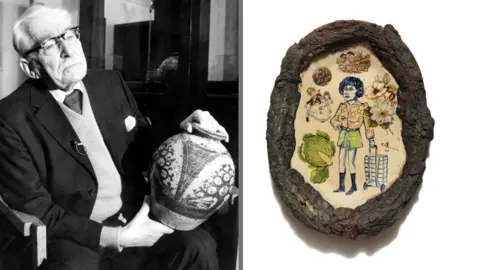 (L) Getty Images (R) Grayson Perry/Victoria Miro
(L) Getty Images (R) Grayson Perry/Victoria Miro It is testament to the formative influence of outsider art on Perry, who was struck by the honesty and directness of the images produced by the untrained and often mentally disturbed.
Four years later he's riffing on Japanese teaware from the Edo period in a vase called Western Art in the Form of a Saki Bottle (1992).

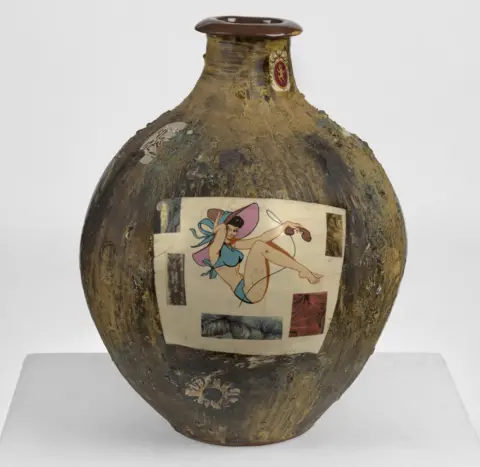 Grayson Perry/Victoria Miro
Grayson Perry/Victoria Miro
Here he plays the ultimate post-modernist, referencing not only Asian culture, but also Pop Art, surrealism, modernism, northern European gothic and Hogarth's English satire - all wrapped up in sincere love for a William Morris-like commitment to craftsmanship.
If you're not a Grayson Perry fan, this show isn't going to convert you.
But if you are, like me, then it's well worth taking your chances with Mrs Stockbridge in Room 1.
Recent reviews by Will Gompertz
Follow Will Gompertz on Twitter
